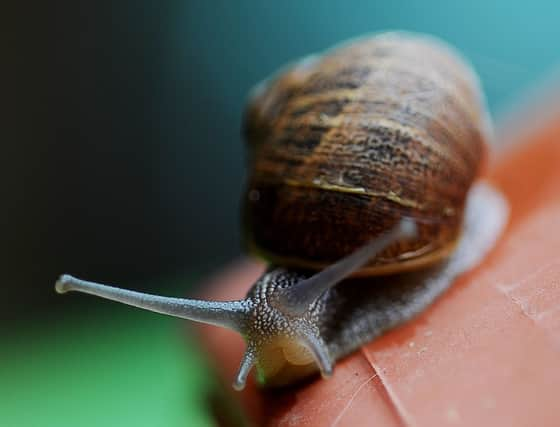'Make friends with molluscs': British gardeners urged to learn to love 'secretly helpful' slugs and snails


British gardeners are being urged to rethink their relationship with the oft-maligned slug and snail, to adopt a more environmentally friendly approach to gardening.
The Wildlife Trusts and the Royal Horticultural Society (RHS) have joined forces to challenge the negative perception surrounding slugs and snails in British gardens. Their new ‘Making Friends with Molluscs’ campaign, launched on Thursday (14 March), aims to encourage gardeners to reconsider the role of the tiny creatures in their garden ecosystems.
Advertisement
Hide AdAdvertisement
Hide AdSlugs and snails had long been viewed as a gardener’s greatest foe, but this reputation wasn't wholly deserved, RHS senior wildlife specialist Helen Bostock said. There were actually around 150 species of slugs and snails in the UK, she added "While a small number of slugs and snails can cause damage to certain plants, overall they bring many benefits to the garden and contribute to a balanced ecosystem, whether that’s by clearing away rotting vegetation or providing a vital food source for more popular garden visitors.
"The RHS wants everyone to help protect the plants, animals and fungi that benefit our gardens and protect the wider environment," she added. "We hope that by highlighting the crucial work that molluscs do in our gardens we can help give them a well-deserved reputation makeover."
While they may not be as valued as earthworms, slugs and snails provide several important services in our green spaces. One of their most significant roles is as nature’s clean-up crew - but they can also clean algae off of greenhouses, leaving behind their trademark trails. On top of this, territorial slugs, like leopard slugs, actually ward off other species of slug, and protect plants from grazing.
The Wildlife Trusts' climate change and evidence director, Kathryn Brown, said she had always welcomed slugs and snails in her garden. "They play such an important role in maintaining natural functionality. Many of them are detritivores, consuming dead plants, animals and fungi, recycling nutrients back into the soil and creating nutritious compost, great for growing vegetables, fruit and flowers."
Advertisement
Hide AdAdvertisement
Hide AdMany much-loved garden visitors, including frogs, ground beetles, and hedgehogs rely on slugs and snails as a key food source, she added. They were also important for song thrushes - a beloved garden bird which has declined a whopping 80% since 1979, according to the RSPB's Big Garden Birdwatch. By supporting these molluscs, gardeners were indirectly supporting a diverse array of wildlife.
Five tips to live harmoniously with slugs and snails
- Provide shelter: Create habitats for slugs and snails by leaving log piles, mulch, and natural debris in garden areas. These spaces offer shelter and a food source for these creatures, and it may make them less likely to venture into your vegetable bed.
- Selective planting: Choosing plants that are less attractive to slugs and snails or are more resilient to their feeding habits, such as lavender, rosemary, hardy geraniums, hellebores and hydrangeas.
- Barriers: Use barriers in your garden – such as copper tape and wool pellets – which may provide some protection for vulnerable plants from slug and snail damage.
- Handpick and monitor: Regularly inspect plants for signs of slug and snail damage, and manually remove any you find, relocating them to your compost heap or areas with less vulnerable plants. Consider evening patrols with a torch, as slugs and snails are most active at night-time.
- Encourage predators: Create a haven for natural predators of slugs and snails, such as ground beetles, song thrushes, frogs, and toads, by providing suitable habitats, such as long grass, log piles and wildlife-friendly ponds. Predators help to naturally regulate slug and snail populations, keeping their numbers in balance.
"The Wildlife Trusts want everyone to avoid using pesticides which can indiscriminately harm other creatures too," Ms Brown continued. "You can grow a range of plants that snails and slugs tend to not eat, such as onions and hardy herbs, instead of trying to control them. These marvellous molluscs help to enrich and aerate the soil, and they’re also a great food source for other incredible animals."
Amber Allott is NationalWorld’s environment and sustainability specialist, covering all things green - from climate to conservation. If you liked this article you can follow Amber on X (Twitter) here and sign up for the free daily NationalWorld Today newsletter here - with Amber bringing you the UK's most important, pressing, weird and wonderful environmental stories every Tuesday.
Comment Guidelines
National World encourages reader discussion on our stories. User feedback, insights and back-and-forth exchanges add a rich layer of context to reporting. Please review our Community Guidelines before commenting.
